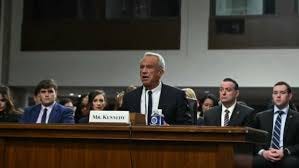RFK Jr. Struggles with Medicaid Questions During Senate Confirmation Hearing
Kennedy faced tough inquiries from key Republican senator on potential Medicaid reforms.
WASHINGTON — Robert F. Kennedy Jr., President Donald Trump’s nominee for secretary of the Department of Health and Human Services, encountered several stumbling blocks during his Senate confirmation hearing on Wednesday, particularly when questioned about Medicaid, the federal health insurance program covering nearly 80 million low-income Americans.
As Republicans in Congress seek ways to reduce federal spending, Medicaid has come under scrutiny, with proposed cuts being considered. If confirmed, Kennedy would be responsible for overseeing the implementation of Medicaid, as well as Medicare and the Affordable Care Act.
During the hearing, Sen. Ron Wyden (D-Ore.), the ranking member of the Finance Committee, criticized Kennedy for appearing “unprepared” and noted his confusion between Medicaid and Medicare. “My colleagues have been seeing back-and-forth between Medicare and Medicaid, and it’s not clear which program you’re using when,” Wyden said.
Sen. Bill Cassidy (R-La.), a physician, pressed Kennedy repeatedly on potential Medicaid reforms and asked for his thoughts on how to address the program’s future. “Republicans are looking at ways to potentially reform Medicaid to help pay for President Trump’s priorities,” Cassidy said. “What thoughts do you have regarding Medicaid reform?”
Kennedy responded, “Most people who are on Medicaid are not happy. The premiums are too high, the deductibles are too high, the networks are narrow.” However, a 2023 poll from KFF, a health policy nonprofit, found that most Americans hold favorable views of Medicaid. Additionally, people on Medicaid typically do not pay premiums or deductibles.
When Cassidy asked for specific ideas on how to improve Medicaid, Kennedy mentioned the use of telemedicine and artificial intelligence but did not elaborate further. He stated, “I don’t have a proposal for dismantling the program. I think what we need to do is experiment with pilot programs in each state,” emphasizing a focus on value-based care, transparency, accountability, and access.
Kennedy also suggested that Medicaid wasn’t delivering "positive health outcomes," claiming, “We’re spending $900 billion, and our people are getting sicker every single year.” This comment was contradicted by a 2022 study published in The Lancet, which showed that Medicaid expansion under the Affordable Care Act led to a reduction in deaths from all causes. Other studies have shown that Medicaid expansion improved physical health for older adults.
Wyden expressed skepticism about Kennedy’s position, telling him, “You haven’t told me anything this morning that would suggest that you have a good argument that indicates you believe Medicaid is inefficient.”
In addition to Medicaid, Kennedy was also asked about other health programs, including Medicare. He stated that “more people would rather be on Medicare Advantage, because it offers very good services,” possibly signaling support for privatizing Medicare. Medicare Advantage, a plan offered by private insurers, has been a point of discussion, especially with Dr. Mehmet Oz, nominated by Trump to lead the Centers for Medicare & Medicaid Services, advocating for further privatization of the program.


